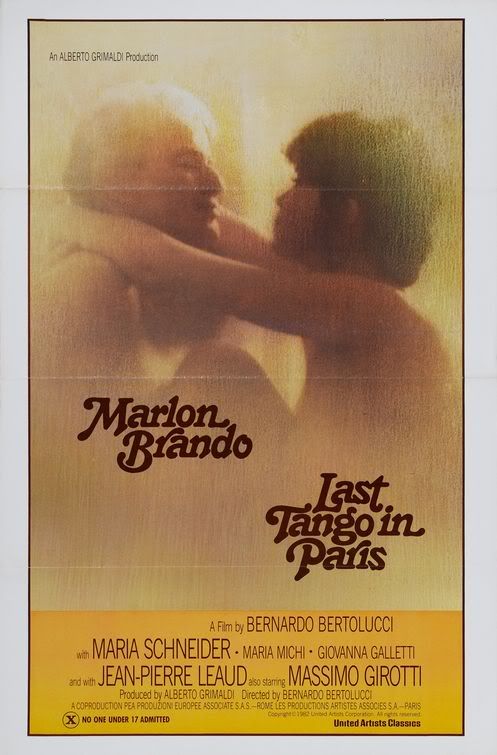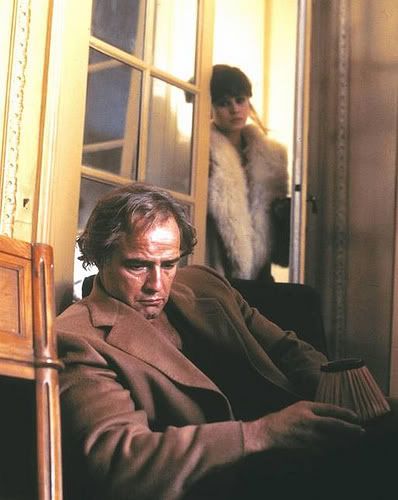Last Tango in Paris

Title: Last Tango in Paris (Ultimo tango a Parigi)
Rating: 4/5
Genre: (Erotic) Romantic Drama
Director: Bernardo Bertolucci
Starring: Marlon Brando, Maria Schneider
Language: French, English
“Even if a husband lives 200 fucking years, he’ll never be able to comprehend his wife’s real nature”
 So, another ‘twin’ review I roped D. Bearer into doing, not that the choice of Bertolucci needed much persuading given his well earned status of derision for his very stark, bleak and often excessive approach to his subjects, pushing boundaries beyond far beyond what was commonly thought of as acceptable. It is perhaps upon realising that his desire for authenticity was so great that this eccentric Italian director has resorted to use two non-native languages to suit the piece, choosing the location to ideally suit the romantic theme; this is about as far removed from that cliché romantic drivel that so often plagues us as you could imagine, almost a serious satirical look between the romanticist fantasy and the gritty realism of lust and desire.
So, another ‘twin’ review I roped D. Bearer into doing, not that the choice of Bertolucci needed much persuading given his well earned status of derision for his very stark, bleak and often excessive approach to his subjects, pushing boundaries beyond far beyond what was commonly thought of as acceptable. It is perhaps upon realising that his desire for authenticity was so great that this eccentric Italian director has resorted to use two non-native languages to suit the piece, choosing the location to ideally suit the romantic theme; this is about as far removed from that cliché romantic drivel that so often plagues us as you could imagine, almost a serious satirical look between the romanticist fantasy and the gritty realism of lust and desire.Without an ego, he presents a likeable young director within his own film that perhaps is intended to resemble him in his youth, naïvely chasing the young woman, Jeanne (Schneider) in the hopes of sparking the beginning of a blossoming romance, starkly contrasted by her dysfunctional relationship with the middle aged man Paul (Brando). Trapped between the lover that is wrapped in his fantasy of perfection, constantly arriving with a film crew to capture each moment of her that he can; his romantic intentions in practice come as all too clingy and irritating, forcing her back into their secret apartment and into the arms of the unpredictable cynic, using each other in a lust-filled passion that denies them any knowledge of who the other really is.
Despite Brando’s annoying penchant for melodrama, this rarely rears its ugly head, constrained by the character itself, his portrayal of him, slowly releasing clues as to who he is allowing the audience to simultaneously comprehend him without ever being sure where he came from. Improvising much of his dialogue, often refusing to learn his lines (in fact, there is an entire scene where he speaks of his own childhood, and a famously improvised ‘butter’ scene) it is somehow that when he speaks he brings a powerful emotional conviction that means you can’t help but hang on to every word; more than a fleeting interest, you find yourself heavily investing in this dark and mysterious character, adamantly refusing to let people know of his dark depressed past that has robbed him of his energy, the mysterious circumstances surrounding his wife’s death that never gets put into black and white terms. Coupled with this is an excellent performance from Schneider herself, whilst the drab and predictable scenes with her lover could have easily worn thin given much longer, the sheer unpredictability of Brando’s performance improved her own ability to react to his actions, and behave in an all too gritty and realistic manner.
 The soundtrack was well utilised despite being highly repetitive, working in such a way to assist the contrast between the two situations and produce a cyclical feel to the proceedings, as she constantly bounced back and forth between them. The cinematography shouldn’t be understated either, making apt use of his surroundings, working well with light and shadow to emphasise each point, display each contour and grey hair of the shadowy figure, the stark contrast of the blood against the excited woman during the early scenes and the atmosphere of the dark and claustrophobic room against the lighter, open expanses of the surrounding city.
The soundtrack was well utilised despite being highly repetitive, working in such a way to assist the contrast between the two situations and produce a cyclical feel to the proceedings, as she constantly bounced back and forth between them. The cinematography shouldn’t be understated either, making apt use of his surroundings, working well with light and shadow to emphasise each point, display each contour and grey hair of the shadowy figure, the stark contrast of the blood against the excited woman during the early scenes and the atmosphere of the dark and claustrophobic room against the lighter, open expanses of the surrounding city.The manner they act when alone in this apartment is far more crude than you would expect of such a film; they swear and insult one another and act without repercussions as a result of knowing the nature of their affair, and making conscious effort to not know anything about one another, and it is through this that allows their true self to emerge. Not the past behaviour or memories but the present, and whilst this often results in a freedom to revert to an almost child-like mentality, playing and toying with one another without care, a critical question posed is that of the other side to this blade; that with absolute freedom you are able to see precisely who the other person is, no lies or secrets or hidden thoughts, and this can be a genuinely dangerous thing to come to comprehend. As much as fantasies will never come true, it is perhaps not only beneficial to conceal part of your true nature for the benefit of others, but essential for once you learn what the other is capable of you may never be able to forget it.

Comments
Post a Comment